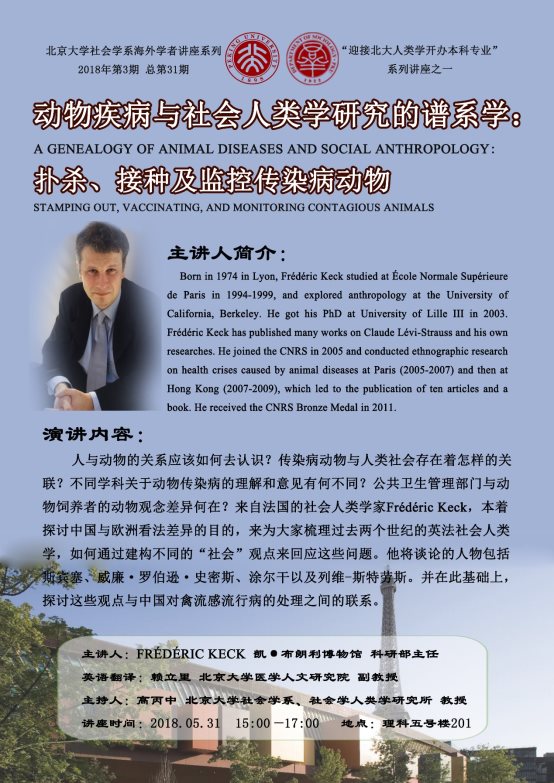A Genealogy of Animal Diseases and Social Anthropology:Stamping out, Vaccinating, and Monitoring Contagious Animals

Frédéric Keck(弗雷德里克·凯克)
主讲人:Frédéric Keck(凯·布朗利博物馆 科研部主任)
英语翻译:赖立里(北京大学医学人文研究院 副教授)
主持人:高丙中(北京大学社会学系、社会学人类学研究所 教授)
时间:2018-05-31(周四) 15:00-17:00
地点:理科五号楼201
主讲人简介:
Born in 1974 in Lyon, Frédéric Keck studied at École Normale Supérieure de Paris in 1994-1999, and explored anthropology at the University of California, Berkeley. He got his PhD at University of Lille III in 2003. Frédéric Keck has published many works on Claude Lévi-Strauss and his own researches. He joined the CNRS in 2005 and conducted ethnographic research on health crises caused by animal diseases at Paris (2005-2007) and then at Hong Kong (2007-2009), which led to the publication of ten articles and a book. He received the CNRS Bronze Medal in 2011.
讲座内容:
Stamping out, vaccinating and monitoring animals are the three main techniques used by contemporary veterinary public health to manage animal diseases which can transmit to humans. They assume different ontologies of microbes as invisible beings emerging in relations between humans and animals and signaling their transformations. Therefore, animal diseases are not only a question for an applied anthropology, but they involve the theoretical core of the discipline, that is, the ontology of collective beings emerging out of interactions. What we would call a biosecurity intervention today was justified in the last two centuries as a way to produce “society”, but this notion has become problematic to understand the emergence and proliferation of new pathogens in animal reservoirs. Different techniques of treatment for animal diseases involve different views of animals, often conflicting between public health administrations and animal breeders. Rationalities of risks involve different ontologies of the social when they concern relations between humans and animals.
To defend this argument, I will examine the transformations of social anthropology in relation to changing animal diseases in Britain and France in the last two centuries. I will successfully describe what Herbert Spencer wrote about foot-and-mouths disease, what William Robertson Smith thought in the context of bovine tuberculosis, how Emile Durkheim took vaccination for smallpox as a metaphor for the pathologies of the social and what Claude Lévi-Strauss wrote about mad cow disease. Considering these four major thinkers as building different views of « the social » in response to the threat of a contagious animal disease, I will finally ask how they are relevant to think about the management of bird flu pandemic in China - thus shifting from European cows to Asian birds. The aim of my talk is to ask how the idea that the globe should be prepared to a pandemic coming from Asian birds profoundly differs from European.
社会学系海外学者讲座系列-2018年第3期 总第31期
“迎接北大人类学开办本科专业”系列讲座之一
北京大学国际合作部
北京大学社会学系
